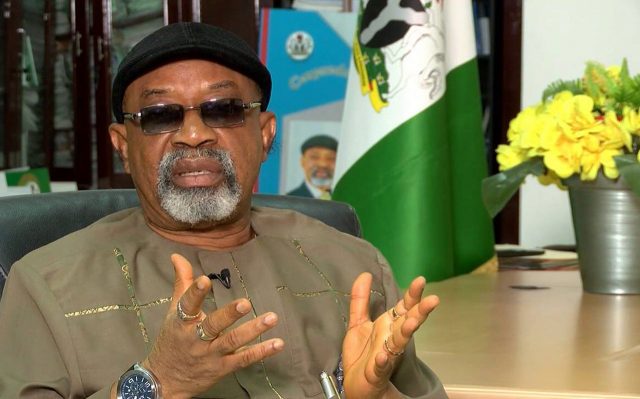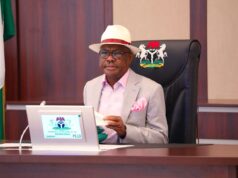The Minister of Labour and Employment, Sen. Chris Ngige, has urged organised labour to continue to eliminate actions inimical to the quest for good governance and development in Nigeria.
Ngige gave the admonition in Abuja on Sunday during the commemoration of the 2022 Workers’ Day.
The 2022 event was held with the theme, ‘Labour, Politics and the Quest for Good Governance and Development in Nigeria’.
The minister appealed to labour unions to embrace acclaimed instruments of consensus building in times of differing opinions, rather than debilitating actions that lead to complications, such as loss of man-days and decreased productivity that threatens the existence of the enterprise and results in job losses.
Ngige, who noted that the rights emanating from employment relationships are reciprocal, pointing out that government in addition to being the “competent authority” in tripartism, was also an employer, explained that Article 2 of the ILO Convention offers workers and employers protection against any acts of interference by each other or each other’s agents or members in their establishment, adding that the principle of reciprocity must be respected.
According to the minister, trade unions, in a quest for good governance, must not dictate the manner government runs its business, just as the government shouldn’t interfere in the internal affairs of trade unions.
He noted that the current administration has been faithful to the principle of labour relations.
Ngige further described the theme for the 2022 May Day as very apt with the next general election around the corner and the electoral processes gathering momentum to usher in “new servants” for the country.
Urging the unions to use the opportunity to mainstream the yearnings of workers, the minister said: “One wonders the extent trade unionism and politics could cohabitate and interrelate. I am aware though there could be a parallel progressive linear interrelationship between trade unionism and body politics.
READ ALSO: 2023: Our 16m votes ‘ll go to working-class friendly parties ― Labour
“In building and sustaining the interrelationship, we also know that trade unions representing workers and voicing the needs and aspirations of those workers could be partners with the government in determination and application of the economic and social policies by utilizing social dialogue as a veritable instrument to forge new social pacts at times of socio-economic upheaval.”
Ngige reminded the organised labour that it is illegal, except where expressly stated in the union’s rules, to use its dues to fund political activities.
“Freedom of Association is closely bound up with respect for civil liberties, however, we note that there is a distinction between the exercise of such rights and matters that could impair Fundamental Principles and Rights at Work.
“Our national Labour Laws recognize this distinction and provide that no Trade Union dues shall be applied for political purposes except if the registered rules of the Trade Union so allows.
“However, trade unions’ political relevance is most needed for good governance of the nation, for that is the main anchor for labour administration, social dialogue, social justice, equity, and decent work,” he added.
Speaking on the COVID-19 pandemic which affected businesses especially small and medium enterprises globally, Ngige noted that the informal economy was the worst hit in Nigeria.
He, however, stated that the Federal Government had in response set up a number of social programmes to cushion the effects of the pandemic.
“We join the global community to affirm our zeal and determination to as much as possible, build ‘forward better’ that which the pandemic took from humanity.
“We recognize all the global declarations and blueprints for development such as the African Union (AU) Agenda 2063 which is a development blueprint to achieve inclusive and sustainable socio-economic development in the African Continent over a span of time, the United Nations Sustainable Development Goals (SDGs) which is a universal call to action to end poverty, protect the planet, and ensure that by 2030 all people enjoy peace and prosperity, and the United Nations ‘Our Common Agenda’ which is an agenda of action, designed to strengthen and accelerate multilateral agreements – particularly the SDGs 2030 Agenda – and make a tangible difference in people’s lives.
“These are all political Instruments for good governance and development which the trade union movement could key into in partnership with the government and build a nation we can all acclaim as good,” the minister noted.
- xAI buys X for $33bn - March 29, 2025
- Wike: Why NBA condemned emergency rule in Rivers - March 29, 2025
- Wike: I didn’t revoke PDP’s secretariat land to suppress opposition - March 29, 2025









